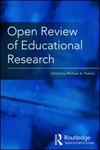Advice for writing a thesis (based on what examiners do)
Q1 Arts and Humanities
引用次数: 9
Abstract
ABSTRACT In the article, ‘What examiners do: What thesis students should know’, we identified 11 things that thesis examiners do as they read and judge a thesis. But, we left a gap in the research: knowing this, What should thesis students do to write for their examiners? In this article, I fill the gap. The advice for thesis students is: first, treat your examiners as friends who want you to pass, and write calmly without agonising about getting it perfect. Aim to make your thesis reader-friendly, and do a thorough proofread to remove distracting errors. Identify the field(s) you will contribute to, and make your thesis interesting and convincing for examiners from this field. Write a draft, get feedback and use this to improve your thesis. Help your examiners to follow your train of thought: explain what you are doing and why, especially if your thesis differs from what they would expect. Convince your examiners that you have a sound interpretation of the literature, an important topic and an appropriate method, and that your conclusions make a significant, publishable contribution to your field. When you have submitted, expect lots of examiner comments, most of which can help you improve.写论文的建议(基于考官的做法)
在文章《主考官做什么:毕业论文学生应该知道什么》中,我们确定了主考官在阅读和判断论文时所做的11件事。但是,我们在研究中留下了一个空白:知道了这一点,论文学生应该如何为他们的考官写作?在本文中,我将填补这一空白。给写论文的学生的建议是:首先,把你的考官当作希望你通过的朋友,平静地写作,不要为写得完美而烦恼。目的是让你的论文对读者友好,并做一次彻底的校对,以消除分散注意力的错误。确定你将贡献的领域,并使你的论文对该领域的考官有趣和有说服力。写一份草稿,得到反馈,并用它来改进你的论文。帮助你的考官跟上你的思路:解释你在做什么,为什么,特别是如果你的论文与他们期望的不同。让你的考官相信你对文献有很好的理解,有一个重要的主题和合适的方法,你的结论对你的领域有重要的、可发表的贡献。当你提交后,期待考官的大量评论,其中大多数可以帮助你提高。
本文章由计算机程序翻译,如有差异,请以英文原文为准。
求助全文
约1分钟内获得全文
求助全文
来源期刊

Open Review of Educational Research
EDUCATION & EDUCATIONAL RESEARCH-
CiteScore
2.60
自引率
0.00%
发文量
0
审稿时长
22 weeks
 求助内容:
求助内容: 应助结果提醒方式:
应助结果提醒方式:


